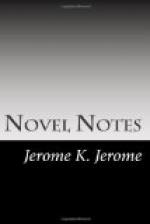“Tell me it is clever and good, my friend, even if you do not think so. The world is very cruel to those that have not yet conquered it, and, though we keep a careless face, our young hearts are scored with wrinkles. Often we grow weary and faint-hearted. Is it not so, my friend? No one has faith in us, and in our dark hours we doubt ourselves. You are my comrade. You know what of myself I have put into this thing that to others will be but an idle half-hour’s reading. Tell me it is good, my friend. Put a little heart into me, I pray you.”
But the other, full of the lust of criticism, which is civilisation’s substitute for cruelty, would answer more in frankness than in friendship. Then he who had written would flush angrily, and scornful words would pass.
One evening, he read me a play he had written. There was much that was good in it, but there were also faults (there are in some plays), and these I seized upon and made merry over. I could hardly have dealt out to the piece more unnecessary bitterness had I been a professional critic.
As soon as I paused from my sport he rose, and, taking his manuscript from the table, tore it in two, and flung it in the fire—he was but a very young man, you must remember—and then, standing before me with a white face, told me, unsolicited, his opinion of me and of my art. After which double event, it is perhaps needless to say that we parted in hot anger.
I did not see him again for years. The streets of life are very crowded, and if we loose each other’s hands we are soon hustled far apart. When I did next meet him it was by accident.
I had left the Whitehall Rooms after a public dinner, and, glad of the cool night air, was strolling home by the Embankment. A man, slouching along under the trees, paused as I overtook him.
“You couldn’t oblige me with a light, could you, guv’nor?” he said. The voice sounded strange, coming from the figure that it did.
I struck a match, and held it out to him, shaded by my hands. As the faint light illumined his face, I started back, and let the match fall:—
“Harry!”
He answered with a short dry laugh. “I didn’t know it was you,” he said, “or I shouldn’t have stopped you.”
“How has it come to this, old fellow?” I asked, laying my hand upon his shoulder. His coat was unpleasantly greasy, and I drew my hand away again as quickly as I could, and tried to wipe it covertly upon my handkerchief.
“Oh, it’s a long, story,” he answered carelessly, “and too conventional to be worth telling. Some of us go up, you know. Some of us go down. You’re doing pretty well, I hear.”
“I suppose so,” I replied; “I’ve climbed a few feet up a greasy pole, and am trying to stick there. But it is of you I want to talk. Can’t I do anything for you?”
We were passing under a gas-lamp at the moment. He thrust his face forward close to mine, and the light fell full and pitilessly upon it.




